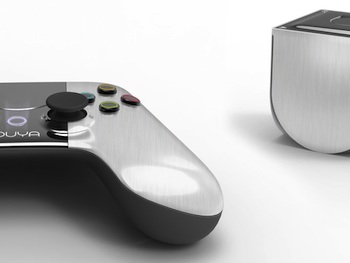Ouya and why the world of game consoles is ripe for a revolution
It’s a golden opportunity for outsiders
Share

If there’s one fact that crystallized a little more last week, it’s that the video game industry is set for some major disruption. Ouya, an Android-running set-top box that is looking for investment via crowd-sourced funding site Kickstarter, made a big splash on Tuesday. The attention came partly because Kickstarter projects are all the rage these days, but also because there is a definite appetite for just the sort of disruption Ouya is promising. The fact that the effort hit its $1million funding goal in no time indicates just how badly the gaming public wants something new.
The frustration was most effectively articulated by Destructoid reviews editor Jim Sterling in his latest video rant, which he posted a day before Ouya hit Kickstarter. To summarize, Sterling thinks video game consoles – primarily the Xbox 360 and PlayStation 3 – have become “crap PCs” that ultimately defeat their entire purpose. Virtually every console game now requires multiple log-ins, upfront installation, frequent downloadable updates and complicated – and annoying – digital rights management that limits how the game and its assorted content can be used. Whereas once upon a time a person could pop a disc (or cartridge) into the machine and be off to the races in seconds, now there’s a whole slew of hoops to jump through before the action starts.
Lengthy installs and downloads were always the downside of playing games on a PC, but the upside was usually much better graphics. PC games are also often cheaper, if not free, to play online and have more robust player communities, he argues.
One of Sterling’s other bugbears is how game publishers inevitably move to make their big franchises more accessible by appealing to a broader audience through tweaking the games so that they have more action, more romance or whatever. I don’t have a problem with that, but I couldn’t agree more with the general console argument. The irony is that while the games’ content is perhaps being made more accessible, the technology through which they’re played is going in the opposite direction.
I’ve spent the past few weeks working on a few stories that look at the future of computing technology. One wonders whether we’re truly in a post-PC world. The other, which I’m still working on, looks at the idea of ubiquitous computing, or what happens when technology melts into the environment around us. The idea of simplification is central to both stories.
The game console, since its earliest origins, has been a great example of ubiquitous computing – it was perfect technology that was actually hard to even recognize as technology. But, this current generation of hardware – with every successive update and download – has become less and less perfect, which correspondingly means the machines are becoming less and less accessible to non-techies. Sure, they’re packing more power and graphics capability, but they’re infinitely harder to use than, say, the good old Atari 2600. To boil it down: more complex is not good. Simplicity is.
That’s what makes things like Nintendo’s Wii and Microsoft’s Kinect ironic. While both were simplified steps forward to a broader audience, the otherwise continually increasing complexity represents some major steps backward.
It’s hard to pick a scapegoat for all of this–one can’t point the finger only at Microsoft and Sony.
Regardless of who’s to blame, the business of video games is set for major change. It might be a newcomer such as Ouya that sparks the revolution, or as Wired suggests, it’ll more likely be a well-resourced outsider that understands how to disrupt through simplicity. And, yup, that makes Apple a likely candidate.